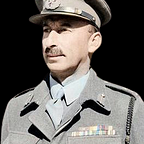A Hypothetical Reconciliatory conversation between Gore Vidal and William F. Buckley Jr.
January 2008, a month before Buckley’s demise
Gore Vidal is seated on a bench, somewhere overlooking the sea, the sun on its steady course to fade into the night. From his right side, another old man finds approaches the bench, and does not ask whether Vidal would mind some company. Vidal looks up to see that it is his long-time rival William F. Buckley Jr. He redirects his gaze towards the sea again as Buckley gets comfortable.
A few moments of silence pass.
Buckley: I was on Charlie Rose’s program a few years ago, and I told him that I was tired of life, and that I was utterly prepared to stop living on. For, there are no enticements to justify the weariness of repetition. I am led, almost in a predictable fashion, to ruminate over life in this acceptance and anticipation of death, and the animosities of the past now seem rather picayune. So does our fervid divarication in 1968.
Vidal: After all these years, you are still the same, Bill, apropos of your ornate style. ‘Fervid divarication’? I would say ‘pugilism’ is a better description of what we did back then.
Buckley: I must concede you scored over me on that fateful day. It has been almost forty years, and I cannot help feel tormented, and penitent — for myself, that is — at the manner in which I lost my characteristic equanimity.
Vidal: I did score over you, and to write it off otherwise would be glib humility; a mendacity I am unprepared to sully myself with.
[A few moments pass]
Vidal: Truthfully, I was not expecting you to be here. I had for a while entertained the idea of a reconciliation in 2000, but you reportedly declared it a closed chapter; that there was no “propitiatory impulse” that you discerned. Yet, here we are.
Buckley: Quite so, but I have grown to fancy, perhaps rather late, that confronting that which torments is more liberating than the inept protestation of one having ‘moved on’.
Vidal: One of two things I thought impossible, then, has finally happened; an eirenicon, if not consummate friendship. We can own up to the now-trivial pugilism between us in 1968…
Buckley: I must interject to insinuate, partly as a matter of humorous consistency, that you are still cantankerous, but let us talk of the second thing you thought impossible.
Vidal: Overlooking your inexhaustible reserves of witticisms, the other thing is the ceaseless degeneration of America into an empire. In many ways, it is one, already, and we saw its consequences manifest on that ill-fated eleventh day of September 2001.
Vidal: You are uncharacteristically silent, Bill. Do I sense despondency within? I should be surprised, if so.
Buckley (shaking his head): The Iraq war is an imbroglio; a failure. No amount of ratiocination on false intelligence concerning weapons of mass destruction would wash off this blemish on the conservative movement. I foresee a terrible time for conservatives in the future.
Vidal: Such has been the story of America for decades, Bill. I gave up on the American experiment in 1950 when Truman acquiesced to the military-industrial complex. Iran, Guatemala, Cuba, Vietnam, Afghanistan, Iraq; the list lengthens. I gather you have revised your opinion on Vietnam, too?
Buckley: I had reservations privately, about the war in Vietnam even in the sixties, but I had not taken the offices of government to have participated in so industrial a scale of dissimulation. I had been to Vietnam, and arrangements, it is now evident in retrospect, were made to project a visage of impending victory.
Vidal (slyly): I suppose you discountenance the view of “giving Gore Vidal to the Vietcong”, too.
Buckley (trademark sly smile): It was a matter of “testamentary integrity”, and an “immoderate” proposition.
[After a moment of silence]
Buckley: I think I can begin to resonate with your perception of America’s decline, albeit for different reasons. My disappointment is owed predominantly to a kind of listlessness that I perceive in American society; a certain atomization that seems to me, prejudicial to community and harmony.
Vidal: It has always been declining, now more so than ever. I have been proven right. You were probably sagacious in your diagnosis of the threat that communism posed in the sixties; I see vestiges of its pernicious essence creeping into the system. But our foreign policy is also to blame in substantial measure.
Buckley: Such, then, have been our respective lives; coadunations of prescience and errors, and, forthrightly, occasionally potent individual pride.
[Rising]
Buckley: I must get going. I do not suppose it would be necessary of us to “keep up” this eirenicon.
Vidal (laconically): No, it wouldn’t.
[Buckley departs, saying nothing, not once looking back. Vidal looks on towards the sea, at the setting sun, and a few minutes later, proceeds home — both perfectly aware that each has been liberated from a burden-of-sorts].
Needless to say, this never happened. Vidal was arguably nastier in his final years, and penned a positively nasty article when Buckley died, and called his nemesis’s grieving son ‘brain-dead’. So much for his desire of a graceful exit.
